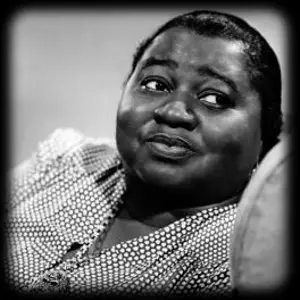 There were many pioneers of racial equality in 20th Century America, but few made breakthroughs in as many areas as Hattie McDaniel. She was the first African American to win an Oscar; probably the first to sing on radio; the first to take the lead rôle in a radio series; first to have two ‘stars’ on Hollywood’s Walk of Fame; and she organised resistance by Black residents to the ‘racial covenants’ on their Sugar Hill properties in Los Angeles in the 40s. This formidable woman also had a fine career as a Blues singer and songwriter in the early days of recording, as part of the rapidly expanding market for ‘race music‘.
There were many pioneers of racial equality in 20th Century America, but few made breakthroughs in as many areas as Hattie McDaniel. She was the first African American to win an Oscar; probably the first to sing on radio; the first to take the lead rôle in a radio series; first to have two ‘stars’ on Hollywood’s Walk of Fame; and she organised resistance by Black residents to the ‘racial covenants’ on their Sugar Hill properties in Los Angeles in the 40s. This formidable woman also had a fine career as a Blues singer and songwriter in the early days of recording, as part of the rapidly expanding market for ‘race music‘.
Hattie McDaniel was born in Witchita, Kansas in 1895, youngest of the 13 children of Henry McDaniel, a freed slave and Civil War veteran, and his wife Susan who was a noted singer in her local Church. The family were no strangers to the stage, as Hattie’s siblings Sam and Etta went on to become actors, and the young Hattie performed in her brother Otis’s minstrel show, writing many of the songs she sang. In 1920, Hattie joined The Melody Hounds touring show, based an Denver, and they sang regularly on a local radio station, making Hattie perhaps the first Black woman to broadcast. Hattie’s strong voice and confident manner got her noticed by Meritt Records in Kansas City, where she made her debut in 1926 with her own songs ‘Quittin’ My Man Today’ and ‘Brown Skin Baby Doll’. A small regional label did not generate many sales, but Hattie was called to
Chicago, where she recorded several times for the Okeh label, including her songs ‘Poor Boy Blues’ and ‘Lonely Heart’. In 1929, Hattie recorded for Paramount Records, including ‘Dentist Chair Blues’, a duet with ‘Dentist Jackson’, who was probably
Papa Charlie Jackson in disguise.
Hattie sings her own song ‘I Thought I’d Do It’ in 1927;
The economic crash of 1929 ended Hattie’s recording career, and she worked in a Milwaukee club, singing and doubling as a cloakroom attendant. She picked up a gig in a travelling production of ‘Showboat’ and ended up in Los Angeles with her siblings Sam, Etta and Orletta. Sam got her a spot with him on The DoNut Hour radio show as the sassy maid, ‘Hi-Hi Hattie’, a stereotypical rôle that was to endure for her whole career. Hattie’s breakthrough in films came with a Mae West movie ‘I’m No Angel’ and she sang a verse of ‘Can’t Help Lovin’ That Man of Mine’ in the 1936 film of ‘Showboat’, and duetted with Paul Robeson. With her rôles growing in prominence, Hattie befriended many Hollywood stars, but it was a surprise when she landed a major part in ‘Gone With the Wind’ because she was more often cast in comic supporting parts. Hattie brought gravitas and wisdom to her character, who criticises Scarlett O’Hara and mocks Rhett Butler, but attracted criticism herself from Whites who thought she was ‘too familiar’ and Blacks who condemned her acceptance of Hollywood stereotypes. The Academy Award for Best Supporting Actress followed, again a first for a Black person, but Jim Crow Laws meant she was not allowed to attend the film’s première in Atlanta, and she had to share a table for two with her husband at the back of the hall at the Oscar ceremony.
Hattie and Paul Robeson in ‘Showboat’ from 1936;
Over the next ten years Hattie appeared in many more films, but she also took on radio work, starring as a maid again, as the lead character in the comedy series ‘Beulah’. She first played the part in 1947, and recorded a series of the TV adaptation of the show, but in early 1952 she was diagnosed with breast cancer and immediately retired. Hattie passed away later that year but, incredibly, those ‘racial covenants’ prevented her from being buried with her movie colleagues in Hollywood Cemetery.
 There were many pioneers of racial equality in 20th Century America, but few made breakthroughs in as many areas as Hattie McDaniel. She was the first African American to win an Oscar; probably the first to sing on radio; the first to take the lead rôle in a radio series; first to have two ‘stars’ on Hollywood’s Walk of Fame; and she organised resistance by Black residents to the ‘racial covenants’ on their Sugar Hill properties in Los Angeles in the 40s. This formidable woman also had a fine career as a Blues singer and songwriter in the early days of recording, as part of the rapidly expanding market for ‘race music‘.
There were many pioneers of racial equality in 20th Century America, but few made breakthroughs in as many areas as Hattie McDaniel. She was the first African American to win an Oscar; probably the first to sing on radio; the first to take the lead rôle in a radio series; first to have two ‘stars’ on Hollywood’s Walk of Fame; and she organised resistance by Black residents to the ‘racial covenants’ on their Sugar Hill properties in Los Angeles in the 40s. This formidable woman also had a fine career as a Blues singer and songwriter in the early days of recording, as part of the rapidly expanding market for ‘race music‘.